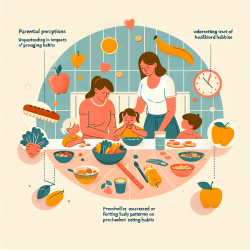Introduction
In the realm of childhood development, the role of parental perceptions in shaping children's dietary habits is crucial. Recent research titled "Association between Parents’ Perceptions of Preschool Children’s Weight, Feeding Practices and Children’s Dietary Patterns: A Cross-Sectional Study in China" sheds light on how parents' views about their children's weight can influence feeding practices and dietary patterns. This blog explores the implications of these findings for practitioners working with young children.
Key Findings from the Study
The study, conducted among 1616 parent-child pairs in China, reveals significant associations between parental perceptions of child weight and feeding practices. Notably, it highlights that:
- Parents often misperceive their children's weight status, with a tendency to underestimate, particularly in cases of overweight or obesity.
- Parental concerns about child weight can lead to different feeding practices, such as increased pressure to eat or food restriction.
- These feeding practices, in turn, affect children's dietary patterns, with potential implications for their long-term health.
Implications for Practitioners
For practitioners in speech language pathology and related fields, understanding the dynamics of parental perceptions and feeding practices is vital. Here are some ways to leverage this knowledge:
- Educate Parents: Provide resources and workshops to help parents accurately assess their children's weight and understand the impact of their perceptions on feeding practices.
- Promote Healthy Feeding Practices: Encourage parents to adopt balanced feeding practices that support children's ability to self-regulate food intake, rather than exerting pressure or excessive control.
- Encourage Further Research: Practitioners should stay informed about ongoing research in this area and consider contributing to studies that explore the interplay between parental perceptions and children's dietary habits.
Conclusion
The study underscores the importance of addressing parental perceptions in efforts to improve preschoolers' dietary patterns and prevent childhood obesity. By focusing on data-driven insights and fostering collaboration between researchers and practitioners, we can create better outcomes for children.
To read the original research paper, please follow this link: Association between Parents’ Perceptions of Preschool Children’s Weight, Feeding Practices and Children’s Dietary Patterns: A Cross-Sectional Study in China.










